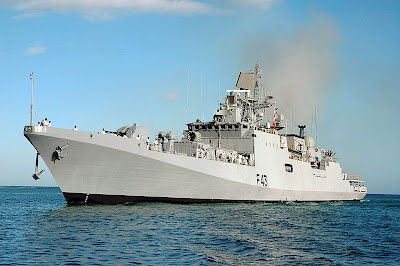 |
| INS Trishul (F43) Talwar class frigate of the Indian Navy |
Russia plans to begin constructing a new generation of "stealth" destroyers in 2012 that will form the backbone of the combat power of Russia's surface fleet, Russian newspaper Pravda reported.
But since much of Russia's income comes from arms sales and exports, that new stealth technology might be simply hype designed to sell boats, Thomas Fedyszyn, director of the Europe-Russia Studies Group at the U.S. Naval War College in Newport, R.I. said.
"They're trying to sell this to India, Vietnam, Indonesia … as marketers, they would per force be required to make statements like this," he told FoxNews.com. (His opinions are his own, not that of the Naval War College, the academy noted.)
"The vast majority of warships built today boast stealthy features to one degree or another," agreed James Holmes, a fellow professor at the Naval War College specializing in Asian sea power. The U.S. has built stealthier ships for two decades, he said.
"Russia is already building stealthy ships for the Indian Navy," he told FoxNews.com.
The news echoes the August unveiling of Russia's first stealth fighter -- nearly two decades after the F-22 Raptor was unveiled, the first U.S. prototype stealth jet. Russia similarly described that plane as "the backbone" of the Russian air force, and of India's.
"Russia's cooperation with India on this project will help it promote the fifth-generation jet on the foreign market," Mikhail Pogosyan, president of United Aircraft Corporation, the state aviation holding company, told the RIA Novosti news agency.
Pravda nevertheless touted the technical might planned for the stealth destroyer: Over the next 20 years, the country plans to build 14 to 16 of the new destroyers, which will be outfitted with a variety of weapons, including anti-ships missiles, anti-submarine torpedoes, and cruise and anti-aircraft missiles. And it could replace three different types of vessel.
"It will leave behind large-anti-submarine ships with the help of state-of-the-art hardware. Its assault and anti-aircraft performance will outstrip present-day destroyers and guided-missile cruisers," a source from the Russian defense industry told Russian language newspaper Izvestia.
U.S. experts were less enthusiastic.
"I'm not persuaded that they will revolutionize surface warfare," Fedyszyn told FoxNews.com. "It's probably not a revolutionary stealth technology that makes them invisible to all things at all times," he said.
Russia does consider its navy a symbol of national pride and prestige, Holmes pointed out, clearly a second key motive behind the stealth boat hype.
How stealthy can a 10,000-ton ship be ?
The sheer size of such a vessel would make it nearly impossible to make it absolutely invisible to every sensor, experts agreed. The improvements to the new Russian ships -- the exact type of stealth technology was not described -- were likely evolutionary tweaks similar to those put in place by other navies.
Every manufacturer making ships today is adding "stealth" technologies, from rubberized gaskets that silence pumps to softer, less-reflective angles to new materials that absorb radar signals rather than bounce them back.
"Everyone who's building ships these days is changing angles so they don't become radar beacons," Fedyszyn told FoxNews.com. "We build them stealthier than we used to build them."
Another form of stealth lies in heat dissipation. Modern stacks are designed to be cooler than they were made 25 years ago, when manufacturers simply didn't think about preventing a ship from showing up on infrared sensors.
"You have to have a much more powerful radar to pick up a 21st century destroyer than a 20th century destroyer," Fedyszyn added.
Ingalls Shipbuilding, the largest manufacturer of Arleigh Burke class destroyers for the U.S. Navy, has built several tweaks into the latest boats to boost stealth. A spokesman for Ingalls declined FoxNews.com requests for more information.
Invisibility technology is being built into countless military vehicles as well, notably the "invisible tank" being built by BAE Systems. One of the ways that company makes its tanks hide is Adaptiv -- an armor encasing that looks and feels as one imagines a dragon's scales to -- which turns tanks into chameleons, allowing them to disappear into the environment behind them.
That's easy to add to a tank. It's tougher on a destroyer.
"Could they also put in a completely radar absorbent material? Very unlikely," Fedyszyn told FoxNews.com.
The U.S. navy planned a next-generation destroyer of its own; called the Zumwalt class or DDG 1000, it was designed to be even stealthier than current generation destroyers -- and was largely cancelled due to cost overruns.
But that hasn't stopped shipmakers from quieting vessels and limited radar cross sections in every new generation.
"This isn't as big a story as the Pravda piece lets on. We've been incorporating stealth features for twenty years," Holmes told FoxNews.com.
FoxNews
No comments:
Post a Comment